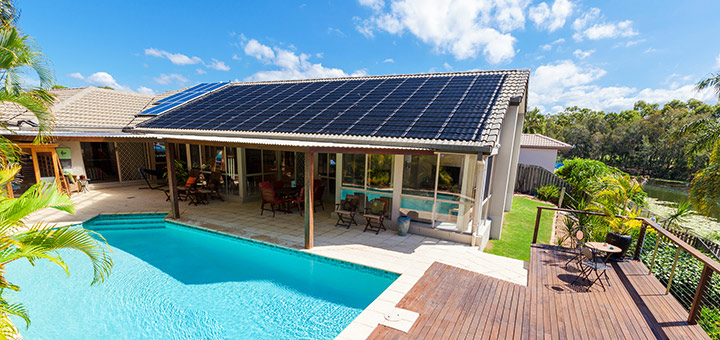Solar has been — and is — changing.
Once thought as simply a “fashion statement” for the rich and environmentally conscious, with tax credits and real monthly savings — every homeowner should consider solar panels. Are they right for you? Keep reading!
Why Should I Install Solar Panels on My Roof?
It’s clear that solar power is a much cleaner source for electricity generation — that’s never been up for much of a debate. With tax credits and many companies offering $0 money down for installation, solar panels for your home are becoming more and more appealing for your average, every day homeowner.
Solar panels provide you with:
- Energy independence from the grid
- Short-term monthly savings
- Long-term savings (due to longevity of solar panels)
- More control over how much you spend on energy
- Reduction of environmental impact and energy emissions
- Tax credits
Can I Install Solar Panels on My Home’s Roof?
Before you start investigating the different brands and types of solar panels on the market, you need to conduct an evaluation on your home — or better yet, get a professional to do it. This evaluation is necessary in order to determine whether or not your home is capable of generating enough solar power to actually save you money. There are some homes in the United States where installing solar panels is actually not recommended.
For example, some homes have tiny roofs, or the trees in the yard provide a too much shade. You might even live in an area of the United States that doesn’t get very much sunlight. All of these elements would have an impact on your home’s ability to generate enough energy to make solar power worth it for you.
While many solar panels can use direct and indirect sunlight to generate power, the orientation and tilt of those solar panels is key to getting the most out of your system.
Energy Consumption
After you determine whether or not your home would make a good fit for solar panel installation, the next thing you need to do is figure out how much electricity you consume. Completing an energy load analysis, or general electricity analysis will help you to determine if your home can generate enough power via solar panels. It will also help you to determine the correct size of solar power system you will need to install. Again though, this is probably another task for a professional.
Installing the Right Solar Panels
There are many different types of solar panels on the market. At first glance, it might seem like installing solar panels is an easy project that you can finish in a weekend. However, you need to keep in mind the fact that if you install the panels incorrectly, or purchase low quality panels, it will be difficult to take advantage of any energy savings. That is why we recommend hiring a professional that can help you make the best and most informed decisions.
There are many solar power companies in the United States that provide solar panels, and solar panel installation services. These types of companies will generally offer one or all of the following:
Purchasing Solar Panels
This option is often the one that makes the most financial sense in the long-term. While the cost might seem high upfront, there are ways to reduce the total amount with tax credits. This option does not include maintenance, however most solar panels come with a minimum warranty of 25 years.
Purchase Power Agreement
In this situation, a company owns the the solar panels and other related equipment. You are charged based on the number of kWh you consume.
Renting Solar Panels
In this situation, you can rent the solar panels from a company. This prevents you from spending a significant amount upfront. Any electricity that is generated, you get to keep and the company will also provide maintenance. However, the solar panels do not belong to you, which means that you won’t benefit from many of the available tax credits.
How Much Will I Save Installing Solar Panels?
Going Solar in America: Ranking Solar’s Value to Consumers in America’s Largest Cities is a study conducted by NC State University’s NC Clean Energy Technology Center. The team involved in the study ranked 50 of the largest cities in the United States based on best overall solar power savings.
When it came to first year monthly savings some of the cities revealed significant savings. Some of the survey’s results are as follows:
- Oakland homeowners saved $187 per month
- San Francisco homeowners saved $187 per month
- San Jose homeowners saved $186 per month
- Long Beach homeowners saved $131 per month
- Phoenix homeowners saved $105 per month
- Boston homeowners saved $103 per month
- Chicago homeowners saved $67 per month
- Portland homeowners saved $44 per month
The study concluded that customers with solar panel systems save an average of: $44 – $187 per month within the first year.
Tax Credits & Other Savings
There are many different types of credits that you can apply for should you install solar panels on your home. Some of the most common types of saving you will see include solar tax credits, solar rebates, and solar renewable energy credits. The kinds of rebates, credits and taxes you can apply for depend on where you live in the United States. Additionally, some rebates are available in one state are not available in another.
For more information on the types of credits, rebates or tax savings available to you, contact a solar panel company in your area. A reputable company will have all of the details you need in order to make the most out of your solar panel investment.



